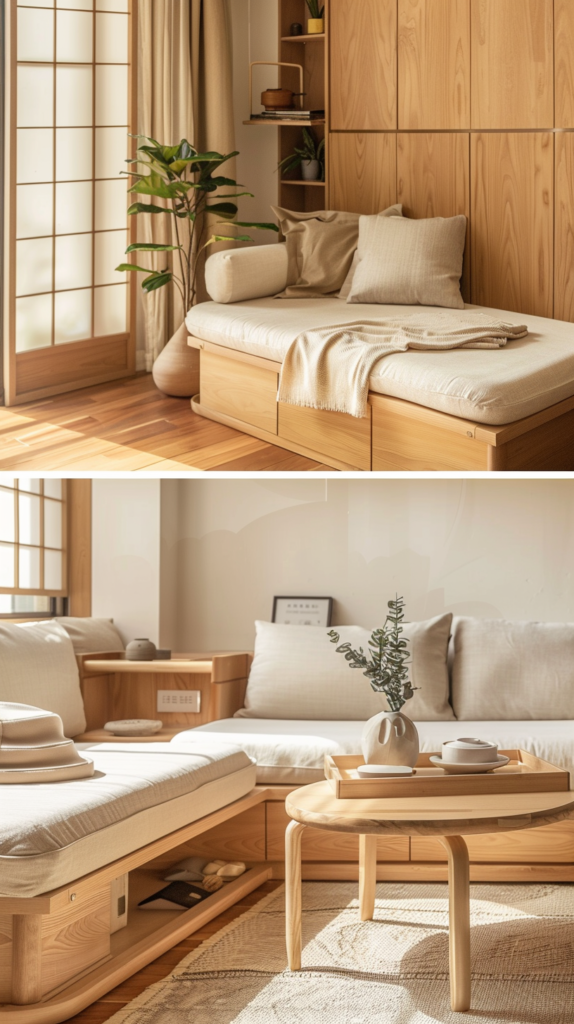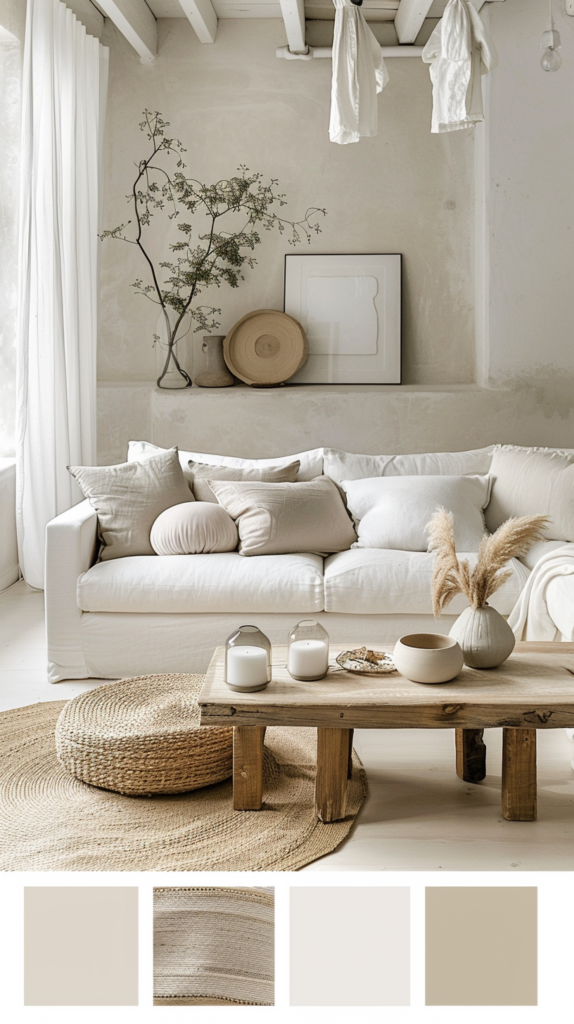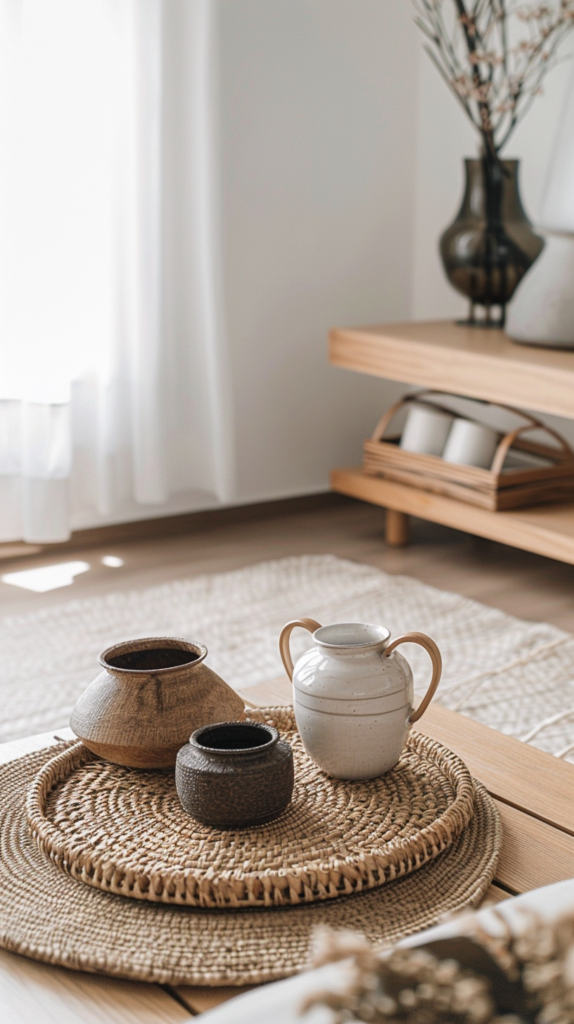Disclosure: Some links on this site are affiliate links. As Amazon Associates, we earn from qualifying purchases (at no cost to you).
Are you ready to transform your living room into a serene and stylish retreat? Japandi, a harmonious blend of Japanese minimalism and Scandinavian functionality, might be just what you need.
This design trend is gaining popularity for its ability to create spaces that are both functional and beautiful. Let’s dive into 27 Japandi living room decor ideas that will inspire your next home makeover and help you create a space that’s both peaceful and stylish.
27 Japandi Living Room Ideas
1. Neutral Color Palette
Start with a neutral color palette. Shades of white, beige, gray, and soft earth tones create a calm and soothing atmosphere that’s perfect for a Japandi living room.

These colors provide a perfect backdrop for the natural materials and simple furnishings typical of Japandi style. Use different shades and textures to add depth and interest without overwhelming the space.
2. Natural Materials
Incorporate natural materials such as wood, bamboo, and stone. Wooden furniture with clean lines and minimal detailing can enhance the Japandi aesthetic.

Consider bamboo blinds to soften the light entering the room, and use stone vases or bowls as decorative elements. These materials not only add to the aesthetic but also bring a touch of nature indoors, promoting a sense of tranquility.
3. Functional Furniture
Choose functional furniture that combines style and practicality. Opt for multi-purpose pieces like a coffee table with storage or a sofa that doubles as a guest bed.

The idea is to keep the space uncluttered and efficient, reflecting the minimalist principles of Japandi design. Look for furniture that has simple, clean lines and avoids unnecessary ornamentation.
4. Low-Profile Pieces
Japanese interior design often features low-profile furniture, which can help create a sense of openness and space. Incorporate low sofas, coffee tables, and floor cushions to achieve this look.

This approach not only gives the room a modern and sleek appearance but also encourages a more grounded and relaxed lifestyle.
5. Minimalist Decor
Keep decor to a minimum to maintain a clean and uncluttered look. Select a few statement pieces that add character without overwhelming the space.

Think of items like a single piece of abstract art, a carefully chosen vase, or a simple sculpture. Each piece should have a purpose and contribute to the overall aesthetic.
6. Natural Light
Maximize natural light to enhance the serene and airy feel of a Japandi living room. Use sheer curtains or bamboo blinds to allow light to filter through gently.

Position mirrors strategically to reflect light and make the space feel larger and brighter. The goal is to create a bright and inviting environment that feels connected to the outdoors.
7. Greenery
Introduce greenery to bring life and color into your living room. Choose plants with simple, elegant shapes like bonsai trees, ferns, or bamboo.

Not only do plants enhance the aesthetic appeal, but they also improve air quality and add a touch of nature, which is central to the Japandi ethos.
8. Texture
Add texture to your living room to create visual interest and depth. Incorporate elements like wool throws, linen cushions, and woven rugs.

These textures can add warmth and comfort to the space while keeping the overall look sophisticated and understated.
9. Tatami Mats
Tatami mats are a traditional Japanese element that can add authenticity to your Japandi decor. Use them as area rugs or to create a designated seating area.

They bring a natural, earthy feel to the space and can help to define different areas within your living room.
10. Sliding Doors
Sliding doors, inspired by Japanese shoji screens, can add a unique architectural element to your living room.

Opt for doors with wooden frames and paper or frosted glass panels to maintain privacy while allowing light to pass through. They save space and add a distinctive, minimalist touch.
11. Artisan Pieces
Incorporate artisan pieces to add character and authenticity. Look for handcrafted items such as pottery, woven baskets, and hand-carved wooden objects.

These pieces add a personal touch and celebrate the craftsmanship that is integral to both Japanese and Scandinavian design.
12. Simple Art
Choose simple, minimalist art to complement your Japandi decor. Abstract paintings, black and white photography, or calligraphy can add visual interest without overwhelming the space.

The key is to select art that enhances the calm and serene atmosphere.
13. Soft Lighting
Soft, ambient lighting can create a warm and inviting atmosphere in your living room. Use floor lamps, table lamps, and wall sconces with soft white bulbs to achieve this effect.

Avoid harsh lighting that can detract from the peaceful vibe you’re aiming for.
14. Open Space
Maintain an open space layout to emphasize the minimalist approach of Japandi design. Avoid overcrowding your living room with too much furniture or decor.

Keep pathways clear and ensure there is plenty of room to move around comfortably.
15. Layered Textiles
Layered textiles can add warmth and comfort to your living room. Combine different textures and materials like linen, wool, and cotton to create a cozy yet sophisticated space.

Layering textiles also allows you to introduce subtle patterns and colors without overwhelming the room.
16. Natural Wood Flooring
Natural wood flooring is a staple in Japandi design. Choose light-colored wood like oak or maple to keep the space feeling open and airy.

If wood flooring isn’t an option, consider a high-quality wood-look laminate or vinyl flooring.
17. Built-In Storage
Built-in storage solutions can help maintain a clutter-free environment. Incorporate built-in shelves, cabinets, and benches with hidden storage to keep your living room organized.

These solutions can seamlessly blend into the decor and maximize space efficiency.
18. Calming Scents
Introduce calming scents into your living room to enhance the serene atmosphere. Use essential oil diffusers, soy candles, or incense with natural, soothing scents like lavender, sandalwood, or eucalyptus.

These scents can create a relaxing environment and contribute to the overall ambiance.
19. Natural Fiber Rugs
Natural fiber rugs, such as jute or sisal, can add texture and warmth to your living room floor. These rugs are durable and environmentally friendly, making them a great addition to a Japandi-inspired space.

Their neutral tones complement the minimalist aesthetic.
20. Low Seating
Low seating options, such as floor cushions or low sofas, can create a relaxed and informal atmosphere. Incorporate a mix of low seating options to encourage a more grounded and intimate setting.

This approach reflects the Japanese influence in Japandi design.
21. Open Shelving
Open shelving can add both storage and display space in your living room. Use wooden shelves to display books, plants, and decorative objects.

Keep the arrangement simple and uncluttered, focusing on a few carefully chosen items.
22. Stone Accents
Stone accents can add a natural, earthy element to your living room. Incorporate stone coffee tables, vases, or sculptures to bring a touch of nature indoors.

Stone accents can add visual interest and contrast to the softer elements in the room.
23. Neutral Upholstery
Choose neutral upholstery for your furniture to maintain a cohesive and calming color palette. Opt for fabrics like linen, cotton, or wool in shades of beige, gray, or white.

Neutral upholstery allows other elements in the room to stand out and keeps the overall look harmonious.
24. Simple Window Treatments
Keep window treatments simple and functional. Choose sheer curtains, bamboo blinds, or plain fabric shades to allow natural light to filter in while maintaining privacy.

Avoid heavy drapes or elaborate window treatments that can detract from the minimalist aesthetic.
25. Functional Accessories
Select functional accessories that also serve as decor. Choose items like stylish storage baskets, elegant trays, and practical yet beautiful coasters.

These accessories can enhance the functionality of your living room while contributing to the overall aesthetic.
26. Accent Walls
Create an accent wall using natural materials or a subtle, textured paint. Consider a wooden slat wall, a stone feature wall, or a wall painted in a soft, muted color.

Accent walls can add visual interest and define different areas within your living room.
27. Personal Touches
Incorporate personal touches to make your living room feel uniquely yours. Display family photos, personal mementos, or travel souvenirs in a way that complements the Japandi aesthetic.

Personal touches add warmth and character to the space, making it feel more inviting.
FAQ
Q: What are the key elements of Japandi design? A: Japandi design combines the simplicity and functionality of Scandinavian design with the minimalism and natural materials of Japanese aesthetics. Key elements include a neutral color palette, natural materials, functional furniture, and minimal decor.
Q: How can I add warmth to my Japandi living room? A: Add warmth to your Japandi living room by incorporating textured textiles, soft lighting, and natural wood elements. Adding plants and using warm, neutral tones can also enhance the cozy feel.
Q: What type of furniture works best in a Japandi living room? A: Simple, functional furniture with clean lines works best in a Japandi living room. Look for multi-purpose pieces and avoid furniture with excessive ornamentation.
Q: Can I mix other styles with Japandi? A: While Japandi is a blend of Japanese and Scandinavian styles, you can incorporate elements from other minimalist and natural design styles. The key is to maintain simplicity and functionality while ensuring a harmonious look.
Final Thoughts
Japandi design is about creating a space that is both functional and beautiful, combining the best of Japanese and Scandinavian aesthetics.
By focusing on simplicity, natural materials, and a neutral color palette, you can create a living room that is serene, stylish, and welcoming.
Whether you’re redecorating your entire living room or just adding a few Japandi elements, these ideas will help you achieve a balanced and harmonious space. Happy decorating!


